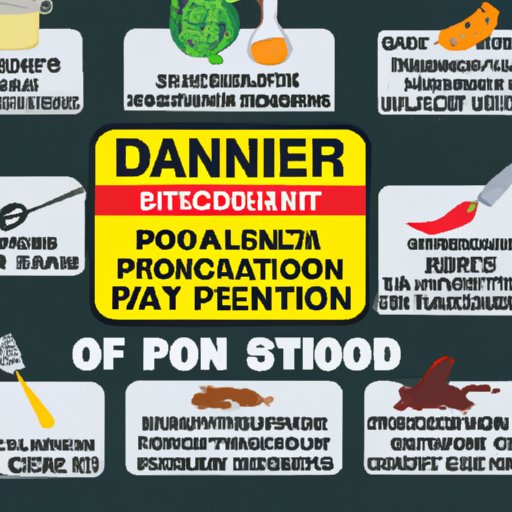Introduction
Food poisoning is a common and sometimes serious illness that affects millions of people each year. It occurs when someone eats or drinks something contaminated with bacteria, viruses, or parasites. Symptoms may include stomach pain, vomiting, diarrhea, fever, and headaches. If left untreated, food poisoning can lead to dehydration and, in rare cases, death.
It’s important to take steps to prevent food poisoning before it starts. By following certain food safety guidelines, you can protect yourself and your family from becoming ill.
Ways to Prevent Food Poisoning
There are several simple steps you can take to reduce your risk of getting food poisoning. Here are a few tips to keep in mind:
1. Wash Hands and Surfaces
Good hygiene is one of the most important ways to prevent food poisoning. Always wash your hands before and after handling food, and make sure to clean any surfaces that have come into contact with raw meat or eggs. According to the Centers for Disease Control and Prevention (CDC), soap and water are the best way to clean your hands; if you don’t have access to soap and water, use an alcohol-based hand sanitizer.
2. Cook Food to the Proper Temperature
Undercooking food can be just as dangerous as overcooking it. Make sure to cook all meats, poultry, and seafood to their recommended internal temperatures. For example, chicken should be cooked to an internal temperature of 165°F. These temperatures can be checked with a food thermometer.
3. Refrigerate Leftovers Promptly
Perishable foods should not be left at room temperature for more than two hours. This includes leftovers and prepared foods such as sauces and dressings. Place them in the refrigerator within two hours of cooking or purchasing them to prevent the growth of harmful bacteria.
4. Avoid Cross-Contamination of Raw Foods with Cooked Foods
Cross-contamination occurs when bacteria from raw food, such as meat, fish, or eggs, come into contact with cooked or ready-to-eat foods. To prevent this, use separate cutting boards and utensils for raw and cooked foods. Also, be sure to wash your hands and surfaces thoroughly after handling raw food.
5. Check Expiration Dates on Food Before Consuming
Expired food is more likely to contain bacteria that can cause food poisoning. Always check the expiration date on food packages before consuming them. If you’re unsure whether a food is still safe to eat, it’s best to err on the side of caution and throw it away.
Conclusion
By following these simple steps, you can help prevent food poisoning before it starts. Washing your hands and surfaces, cooking food to the proper temperature, refrigerating leftovers promptly, avoiding cross-contamination, and checking expiration dates will help keep you and your family safe from foodborne illnesses.
By taking these precautions, you can enjoy meals without worry, knowing that you are doing your part to protect your health.
(Note: Is this article not meeting your expectations? Do you have knowledge or insights to share? Unlock new opportunities and expand your reach by joining our authors team. Click Registration to join us and share your expertise with our readers.)
